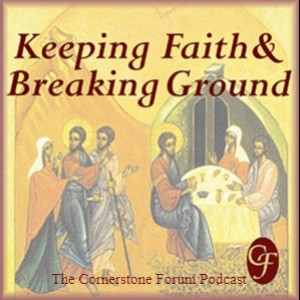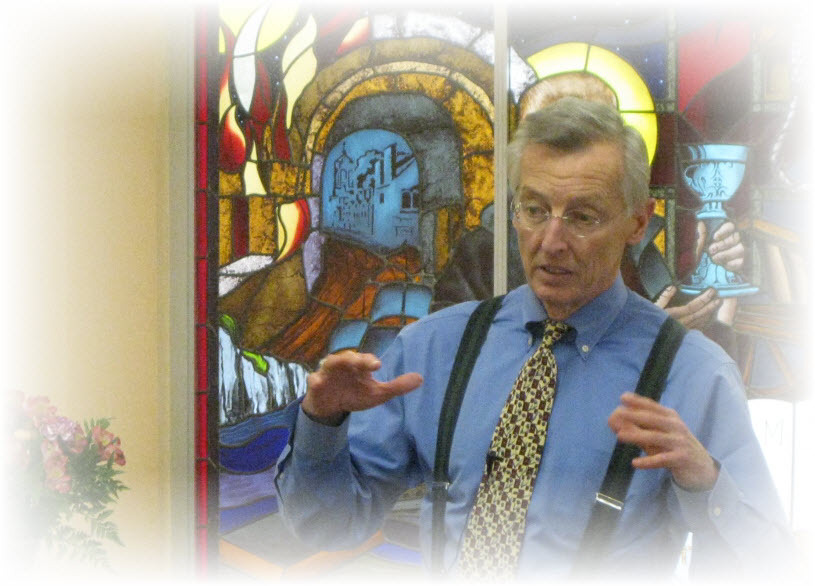Episodes

Friday Jan 28, 2022
Friday Jan 28, 2022
Gil Bailie's exploration of Herman Melville's epic American tale. Melville's masterwork has been recognized as one of the major achievements of 19th century American literature influencing writers down to the present. As confirmed in the 2016 Nobel Prize for literature speech by Bob Dylan, who said, "Moby Dick is a fascinating book, a book that’s filled with scenes of high drama and dramatic dialogue. The book makes demands on you. The plot is straightforward...." Perhaps...but it is a mystery how a young man such as Herman Melville could have written a work of such profound spiritual and poetic depths as Moby Dick. Mr. Bailie helps the listener to begin to unpack some of these deep mysteries in this enlightening series of presentations.

Thursday Jan 27, 2022
Thursday Jan 27, 2022
In Murder in the Cathedral T.S. Eliot is exploring the role of the church in modern society. In these reflections, Gil Bailie asks the question, “What is the church for?”
As a social institution acting in history the church is fallible and bears the same limitations as all social phenomena. It has served worldly interests, has soiled its hands, has passed off the temporal for the eternal. In this sense one may await and demand from the historic church repentance, the recognition of its sins and of its partial betrayal of Christ. – Nicolai Berdyaev
Knowing that the church is a far cry from what it ought to be, is itself a far cry from knowing what it ought to be.

Wednesday Jan 26, 2022
Wednesday Jan 26, 2022
In Murder in the Cathedral T.S. Eliot is exploring the role of the church in modern society. In these reflections, Gil Bailie asks the question, “What is the church for?”
As a social institution acting in history the church is fallible and bears the same limitations as all social phenomena. It has served worldly interests, has soiled its hands, has passed off the temporal for the eternal. In this sense one may await and demand from the historic church repentance, the recognition of its sins and of its partial betrayal of Christ. – Nicolai Berdyaev
Knowing that the church is a far cry from what it ought to be, is itself a far cry from knowing what it ought to be.

Tuesday Jan 25, 2022
Tuesday Jan 25, 2022
In Murder in the Cathedral T.S. Eliot is exploring the role of the church in modern society. In these reflections, Gil Bailie asks the question, “What is the church for?”
As a social institution acting in history the church is fallible and bears the same limitations as all social phenomena. It has served worldly interests, has soiled its hands, has passed off the temporal for the eternal. In this sense one may await and demand from the historic church repentance, the recognition of its sins and of its partial betrayal of Christ. – Nicolai Berdyaev
Knowing that the church is a far cry from what it ought to be, is itself a far cry from knowing what it ought to be.

Monday Jan 24, 2022
Monday Jan 24, 2022
In Murder in the Cathedral T.S. Eliot is exploring the role of the church in modern society. In these reflections, Gil Bailie asks the question, “What is the church for?”
As a social institution acting in history the church is fallible and bears the same limitations as all social phenomena. It has served worldly interests, has soiled its hands, has passed off the temporal for the eternal. In this sense one may await and demand from the historic church repentance, the recognition of its sins and of its partial betrayal of Christ. – Nicolai Berdyaev
Knowing that the church is a far cry from what it ought to be, is itself a far cry from knowing what it ought to be.

Sunday Jan 23, 2022
Sunday Jan 23, 2022
In Murder in the Cathedral T.S. Eliot is exploring the role of the church in modern society. In these reflections, Gil Bailie asks the question, “What is the church for?”
As a social institution acting in history the church is fallible and bears the same limitations as all social phenomena. It has served worldly interests, has soiled its hands, has passed off the temporal for the eternal. In this sense one may await and demand from the historic church repentance, the recognition of its sins and of its partial betrayal of Christ. – Nicolai Berdyaev
Knowing that the church is a far cry from what it ought to be, is itself a far cry from knowing what it ought to be.

Saturday Jan 22, 2022
Saturday Jan 22, 2022
When love begins to sicken and decay,It useth an enforced ceremony.There are no tricks in plain and simple faith;But hollow men, like horses hot at hand,Make gallant show and promise of their mettle;But when they should endure the bloody spur,They fall their crests, and, like deceitful jades,Sink in the trial. – Julius Caesar Act IV scene ii
Eliot in his earlier poetry had described a world where love had begun to ‘sicken and decay’. In the Hollow Men he is trying to re-appropriate the ritual dimension of life and to wrestle with the proposition that such a re-appropriation is no longer possible or perhaps even legitimate. Eliot seems to have arrived at an impasse in his life which was both poetic in terms of his literary career, and religious in terms of his spiritual development.

Friday Jan 21, 2022
Friday Jan 21, 2022
This 3 part series explores Eliot’s poetic works produced after The Hollow Men and before The Four Quartets. Bailie suggests that Ash Wednesday is The Waste Land “contextualized” – a Lenten journey through the desert leading to the Promised Land reflecting Eliot’s own journey into an affirmed Christian faith.

Thursday Jan 20, 2022
Thursday Jan 20, 2022
This 3 part series explores Eliot’s poetic works produced after The Hollow Men and before The Four Quartets. Bailie suggests that Ash Wednesday is The Waste Land “contextualized” – a Lenten journey through the desert leading to the Promised Land reflecting Eliot’s own journey into an affirmed Christian faith.

Wednesday Jan 19, 2022
Wednesday Jan 19, 2022
This 3 part series explores Eliot’s poetic works produced after The Hollow Men and before The Four Quartets. Bailie suggests that Ash Wednesday is The Waste Land “contextualized” – a Lenten journey through the desert leading to the Promised Land reflecting Eliot’s own journey into an affirmed Christian faith.

Keeping Faith & Breaking Ground
Without Christianity neither the nature of the present crisis of culture nor the meaning of history itself can be properly comprehended. If the Christian revelation is to come to our aid in this moment of peril, we must learn to account for its sweeping claims in ways that are faithful to Church teachings, intellectually cogent, morally rigorous, charitable, anthropologically sound, and undeterred by the moribund spirit of our age.



